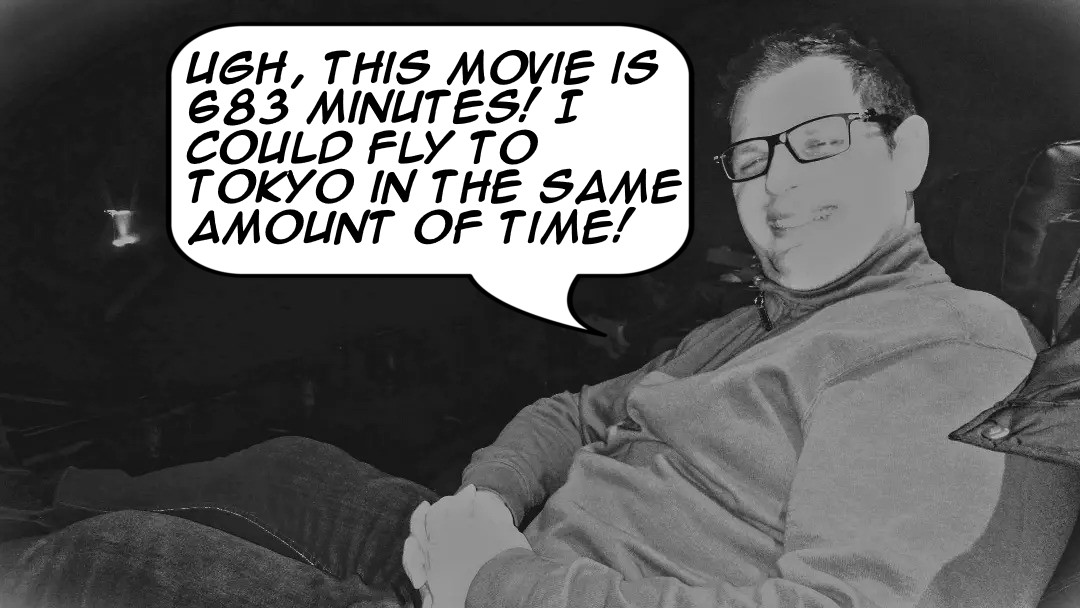The NeverEnding Story: Hollywood's Obsession with Extremely Long Films

"Written on the pages is the answer to a neverending story." - Limahl, The NeverEnding Story
Years ago, I attended a screenwriting course at George Brown College in Toronto. Our instructor would often say, "tell your joke and get off the stage." What she meant by that wise adage was to only include relevant content in your script; everything you write should be in service of progressing the narrative. Anything that deviates from the plot or doesn't progress the story should be omitted.
This is why the rough cuts of films are often much longer when initially screened for test audiences; the filmmakers must gage which scenes work and which should be relegated to the deleted scenes sections of Blu-rays. Our instructor taught us that each page of a screenplay represents one minute of screentime. Therefore, the average length of a script should be between 90 and 120 pages.
There was a time when movies with running times between 150 and 240 minutes were commonly reserved for epics. Lavish period pieces set in antiquity or the medieval era. Compelling biographical films about important historical figures. Gritty and raw war films. Unfortunately, the attitude in Hollywood seems to have shifted from, "tell your joke and get off the stage" to, "bigger is always better."
While the average screentime of movies was once 90 to 120 minutes, the current average now seems to be 150 to 180 minutes. This absurd length is no longer reserved for epics. Nowadays in Tinseltown, anything goes. Where have all the film editors gone? Long time passing. Where have all the film editors gone? Long time ago...
Back in the Golden Age of Hollywood, the extreme length of epics was mitigated by the inclusion of intermissions. These midpoint breaks allowed moviegoers to ease their sore butts, stretch their stiff legs, relieve themselves, and restock on goodies. However, modern Hollywood seems to think the human body, and by extension, the human bladder, has evolved to the point of being able to sit in cramped, uncomfortable seats for 180 minutes straight (or even longer).
Superhero movies are especially guilty of this trend. Take Batman, for example. The original 1989 Batman is 126 minutes. The Dark Knight Rises is 165 minutes. The Batman is 176 minutes. Zack Snyder's Justice League is a whopping 242 minutes. In contrast, the Oscar-winning Joker is 122 minutes. I wish the reasonable runtimes of Batman and Joker were still the rule and not the exception.
This trend applies to many other cinematic franchises as well. The original 1977 Star Wars is 121 minutes, while The Last Jedi is 152 minutes. The original 1982 Blade Runner is 117 minutes, while 2049 is 163 minutes. The original 1962 James Bond flick, Dr. No, is 109 minutes, while No Time to Die is 163 minutes. The original 1996 Mission: Impossible is 110 minutes, while Dead Reckoning Part One is 164 minutes. The original 2014 John Wick is 101 minutes, while Chapter 4 is 169 minutes. These all happen to be "shorter" examples, which isn't saying much.
Don't get me wrong; I'm not suggesting extremely long movies have no place in Hollywood. For example, the entirety of The Lord of the Rings is a combined total of 683 minutes, which makes perfect sense, given the source material is a complex epic the size of the Bible. However, the entirety of The Hobbit is a combined total of 532 minutes, which makes no sense at all, given the source material is a relatively short children's novel that never needed to be stretched into a bloated trilogy, as enjoyable as it was.
In closing, if Hollywood truly wishes to forgo film editors, the least they could do is bring back intermissions. Cinemas should also invest in comfy La-Z-Boy recliners. Until then, I'll wait for these inflated films to arrive on streaming services. That way, I can break up my viewings over a couple of days. Well, I told my joke and now I'm getting off the stage. As always, love, peace, and chicken grease.